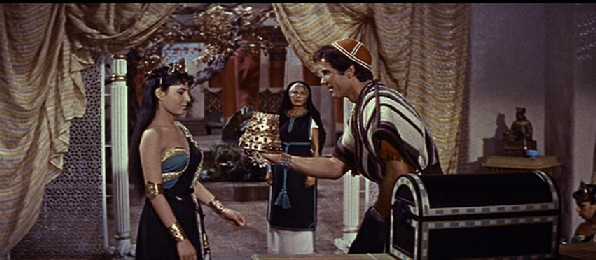
2009 was the year of the Old Testament. Whilst rumours of
forthcoming Jesus films came and went, this year was all about his ancestors.
The biggest Old Testament film of the year was
Year One. Harold Ramis's comedy had a good number of laughs, and made a few interesting points, and whilst the gross-out factor was always going to feature strongly, it seemed a little more reigned in than previous outings by various members of the cast and crew. I really meant to write more about this film than I did, but unfortunately it came at the busiest part of the year for me, and I didn't get a review copy to be able to re-watch certain parts. I did get it on DVD for Christmas so maybe I'll write more this year.
Year One wasn't the only film released in 2009 that used large chunks of Genesis for it's laughs. August saw the release of
The God Complex. I owe the filmmakers a review here, but I'm not sure they're going to want to read it. I'd expected quite a bit from the film, and whilst there are certainly a few good gags early on, they peter out until all that's left is an anti-theistic rant. I'd certainly expected this to offend some, but I'd at least hoped for a good laugh. I guess it just wasn't my humour.
One of the characters to feature in
The God Complex was
Job and an modern take on his story was explored in
A Serious Man. I'm a fan of the Coen Brothers anyway, so their most Biblical film to date has given me plenty to think about, and I hope to see it do well at this year's Oscars.
Modernised versions of Old Testament stories featured on the small screen this year as well.
Kings attempted to modernise the story of David and Saul, but hit trouble early on, and in the end took a mid season break of several months before being allowed to run it's course. Whilst it managed to form a small but solid fan base, most reviews were only so-so, and viewing figures never matched up. 2009 was definitely the year of me not getting sent screeners, but this was the most annoying. NBC didn't send me a preview disc because I wasn't resident in the US. You guys do get what that WWW bit means don't you? So it bombed, and if the DVD price ever drops enough I might fork out and buy a copy, but I suspect it will be a while until I review it.
Lastly there was also
Tutta Colpa Di Giuda(It's All Judas' Fault) about a passion play being performed inside a prison with a
Jesus of Montreal-esque double meaning.
2009 also saw a number of Bible films released on DVD.
Jesus the Christ was a new film mashed together from bits of the Visual Bible's
, Gospel of Matthew. Johnny Got his Gun was a filmed version of a new stage production of the novel. There was also a special edition DVD release of
The Robe as well as DVD releases for
Kings and
Year One.
There was only one new book written on the subject of Bible films. Pamela Grace's
"The Religious Film" looked at how a number of Bible films compared to the characteristics of hagiopics. But the year also saw a reprint of Bruce Babington and Peter Evans' classic
"Biblical Epics". And on the subject of books, a couple of chapters I wrote several years ago finally saw the light in Lee and Baz's
Cut to the Chase 0.5.
As for miscellanaous highlights, the stand out event of the year was the
Ancient World in Silent Cinema day, which screened a number of rare early silent Bible films. I've written a number of
reviews for these films, but still have a few to attend to, if I can ever find my notes again. There was also the inaugural
SBL consultation on The Bible in Film and the
Reel Religion memorabilia exhibition at MoBiA. Also in this section are
Ben Hur's enduring adaptability finding expression in a
stageshow and on the
radio.
On a more personal note, highlights for me this year included, my talks at
Greenbelt (
download mp3) and
Regents Theological College, as well as being interviewed by
Premier Radio and
TWR radio.
2010 may produce a Jesus film or three, although I wouldn't be shocked if none of those lined up actually appear, and rumour has it that the BBC/HBO version of
The Passion (although it may be under a different name).
Labels: Reviews of the Years
 I've just come across a long article on Year One by Anthony Balducci. You have to scroll down whilst he talks about a few other films, but it's the most thorough discussion of the film I've seen so far. Not had time to read it yet, but hopefully will later this week.
I've just come across a long article on Year One by Anthony Balducci. You have to scroll down whilst he talks about a few other films, but it's the most thorough discussion of the film I've seen so far. Not had time to read it yet, but hopefully will later this week.





























